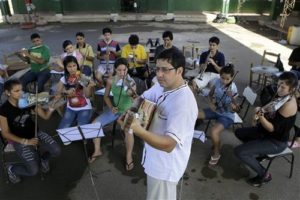
Favio Chavez and the Recycled Orchestra
Caterua in Paraguay houses one of the largest landfills in South America. The landfill receives more than a tonne of waste daily from Asuncion and the surrounding areas. More than 40,000 families live in the slum that has come up on the Cateura landfill. For most of the residents, the only source of income is from collecting scrap and recycling it. There is no basic sanitation or hygiene infrastructure in Caterua.
Nicolas Gomez is one of the trash collector and recycler. One day Gomez noticed a piece of scrap metal that resembled a violin. He brought it to musician Favio Chavez, who is a musician as well as an environmental technician. Moved by the conditions of the slum, he had started a music school for the deprived kids of Caterua. So many kids wanted to learn music that Chavez could not get enough donated instruments.
When Gomez brought the scrap to Chavez, they built their first recycled violin. Soon Gomez, who is also a skilled carpenter, made many instruments out of scrap and the Recycled Orchestra was born.
16-year-old Noelia Rios plays the violin in the orchestra. Her violin, like many in the orchestra, is made out of cans, wooden spoons and bent forks. One of the orchestra’s cellos uses an oil drum for its body. String pegs are created from scrap such as old cooking utensils and even the heel of a worn-out women’s shoe. Drum heads are made from old X-ray film, held in place with copious amounts of packing tape. Fifteen-year-old Tobias Armoa plays a saxophone made out of a drainpipe, melted copper, coins, spoon handles, cans and bottle caps.
When a documentary was made on the recycled orchestra, the story travelled far. The orchestra was invited to perform on foreign countries.
Meanwhile, the ensemble has brought a lot of good to Cateura. Money the orchestra has generated from its international touring has funded the building of new, safer homes for several members of the group and their families — and the orchestra’s lead instrument maker, Cola Gomez.
There’s also been a bigger change. In the community, children are respected. Earlier, when Chavez began teaching music, often the parents take the kids away by the hand because they had to go to work. Now, that’s unthinkable. The orchestra has changed the community.
Chavez says, “The kids playing in the Recycled Orchestra are creating something gorgeous out of nothing. To be a musician, you have to be responsible, persistent, tenacious, conscientious and sensitive. Without these values, you can’t be a musician. But music has such a great power that it can’t just change the kids. It can transform society. ”
Afterword: Landfill Harmonic is the documentary made on the recycled orchestra. You can watch the trailer here. You can find other videos on the Recycled Orchestra on YouTube. There is also a children’s book on the topic: Ada’s Violin: The Story of the Recycled Orchestra of Paraguay by Susan Hood.
